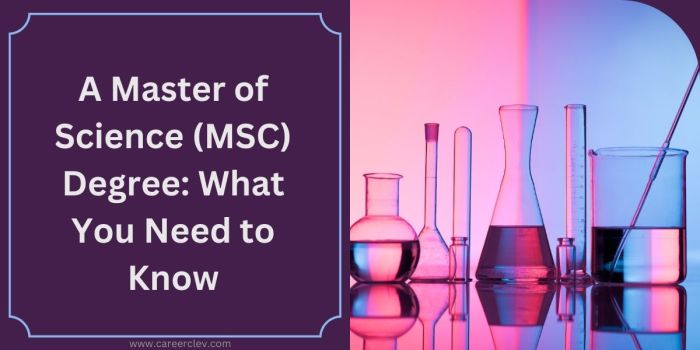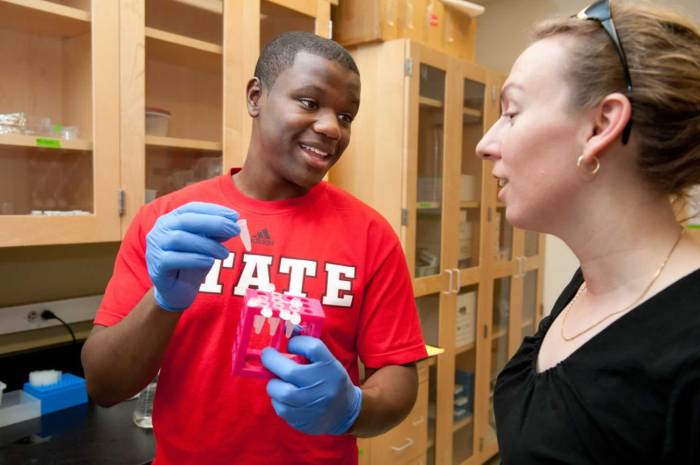msc master science programs stand at the forefront of higher education, offering students a comprehensive pathway to advanced knowledge and specialized skills. These programs encompass a broad spectrum of disciplines, allowing graduates to explore their passions while preparing for the competitive job market. With rigorous academic structures and practical experiences, MSC degrees distinguish themselves from other master’s programs by focusing on scientific inquiry and analytical thinking.
Prospective students keen on pursuing an MSC must navigate a clear set of admission requirements, including academic prerequisites and the critical need for compelling recommendation letters. Crafting a standout personal statement further enhances an applicant’s chances of success. Once admitted, students engage in a diverse curriculum that not only covers core scientific topics but also allows for specialized tracks tailored to various career aspirations.
Overview of MSC Master of Science Programs

MSC Master of Science programs are designed to provide advanced education in scientific and technical disciplines. These programs typically emphasize a combination of theoretical knowledge and practical application, preparing graduates for various professional roles within their field of study. The structure of MSC programs often includes coursework, research components, and sometimes internships or projects, which facilitate a comprehensive learning experience aimed at fostering critical thinking and problem-solving abilities.The requirements for MSC programs generally include a bachelor’s degree in a related field, although specific prerequisites may vary by discipline and institution.
Many programs also require standardized test scores, letters of recommendation, and personal statements as part of the admission process.
Structure and Requirements of MSC Programs
MSC programs are typically structured to encompass a blend of core courses, electives, and a thesis or capstone project. Core courses establish a foundational understanding of essential concepts and methodologies, while electives allow students to explore specialized areas of interest. The following points Artikel the typical structure and requirements:
- Core Curriculum: Foundational courses that cover essential theories and practices relevant to the chosen field.
- Elective Courses: Options that enable students to specialize in specific areas, expanding their knowledge and skills.
- Research Component: Many programs require students to engage in research, culminating in a thesis or research project that contributes to their field.
- Duration: Most MSC programs are designed to be completed within one to two years of full-time study, depending on the institution and study format.
- Internships: Some programs offer or require internships, providing practical experience in a professional setting.
Disciplines Available within MSC Programs
MSC programs cover a wide range of disciplines, reflecting the diverse nature of scientific inquiry and application. Students can choose from various fields, each offering unique perspectives and career opportunities. The following list highlights some of the primary disciplines available within MSC programs:
- Biological Sciences: Focus on living organisms, their functions, and interactions.
- Chemistry: Study of the composition, structure, properties, and reactions of matter.
- Physics: Exploration of the fundamental principles governing the physical universe.
- Computer Science: Emphasis on programming, algorithms, data structures, and software development.
- Engineering: Various branches such as civil, mechanical, and electrical, focusing on design and innovation.
- Environmental Science: Study of ecological processes, environmental issues, and sustainable practices.
- Mathematics and Statistics: Exploration of quantitative analysis, modeling, and data interpretation.
Difference Between MSC and Other Master’s Degrees
The MSC degree is distinct from other types of master’s programs, such as Master of Arts (MA) or Master of Business Administration (MBA), primarily due to its focus on scientific and technical disciplines. While MA programs may emphasize humanities and social sciences, and MBA programs focus on business management and administration, MSC programs are rooted in a rigorous scientific methodology.
“The MSC degree is tailored for those seeking in-depth knowledge and practical skills in scientific fields, setting it apart from more generalized master’s degrees.”
In conclusion, MSC programs offer a comprehensive educational framework designed for those aspiring to excel in scientific and technical fields. The structured approach, diverse disciplines, and emphasis on research distinguish these programs and prepare graduates for various professional roles in an increasingly complex and technical world.
Obtaining a higher education degree can significantly enhance your career prospects. Many professionals find that a relevant degree opens doors to new opportunities, providing both credibility and knowledge in their field. This is especially true for those pursuing advanced roles in dynamic sectors like marketing.
Admission Requirements for MSC Programs

Admission to Master of Science (MSC) programs is competitive and requires a strong academic foundation along with other critical components. Understanding the prerequisites can significantly enhance an applicant’s chances of success. Prospective students must be prepared to meet various academic and personal criteria that institutions often stipulate as part of their admission process.The key admission requirements typically focus on academic qualifications, recommendations, and personal statements.
Fulfilling these prerequisites not only demonstrates a candidate’s readiness for advanced study but also highlights their commitment and suitability for the program.
Common Prerequisites for Applicants to MSC Programs
To apply for MSC programs, candidates must generally possess certain academic and professional qualifications. The following prerequisites are commonly required:
- A bachelor’s degree in a relevant field, such as science, engineering, or mathematics, with a minimum GPA requirement often set around 3.0 on a 4.0 scale.
- Some programs may require standardized test scores, such as the GRE, particularly for fields heavily focused on quantitative skills.
- Relevant work experience or internships can be beneficial, especially for applied science programs, showcasing practical knowledge and skills.
- Proficiency in the English language is required for non-native speakers, often demonstrated through tests like TOEFL or IELTS.
Meeting these prerequisites not only ensures eligibility but also prepares students for the academic rigor of MSC programs.
The Importance of Recommendation Letters
Recommendation letters play a crucial role in the application process for MSC programs. They offer insights into a candidate’s academic abilities, work ethic, and character from the perspective of a knowledgeable third party. Admissions committees often look for the following attributes in recommendation letters:
- Specific examples of the applicant’s skills, achievements, and contributions in academic or professional settings.
- Insights into the applicant’s interpersonal skills, teamwork, and ability to overcome challenges.
- Endorsements from individuals who hold positions of credibility, such as professors, employers, or industry professionals.
Strong recommendation letters can significantly enhance an application by providing context and validation to an applicant’s experiences and qualifications, making them indispensable in the overall evaluation.
For individuals aiming to excel in the competitive marketing landscape, becoming a marketing master is essential. This advanced training equips you with the skills necessary to create effective strategies and understand consumer behavior, making you a valuable asset to any organization.
Preparing a Compelling Personal Statement, Msc master science
The personal statement is a vital component of the MSC application, allowing candidates to express their motivations, goals, and unique qualifications. A compelling personal statement can set an applicant apart from others. Here are some critical elements to consider when crafting this document:
- Begin with a clear and engaging introduction that captures the reader’s attention and provides insight into the applicant’s passion for the field.
- Detail relevant academic and professional experiences, emphasizing how they have shaped the applicant’s interest and preparedness for the MSC program.
- Articulate specific career goals and how the program aligns with those aspirations, demonstrating a clear understanding of the field and the institution.
- Conclude with a strong closing statement that reiterates enthusiasm and readiness to contribute to the academic community.
A well-structured personal statement not only reflects the applicant’s writing abilities but also serves as a narrative that connects their past experiences with their future ambitions, making it a powerful tool in the admission process.
Curriculum and Specializations in MSC Degrees
The curriculum of Master of Science (MSc) programs is designed to provide a comprehensive foundation in both theoretical and practical aspects of the respective fields. This multifaceted approach ensures that graduates are well-prepared for the challenges of their chosen careers. MSc programs typically emphasize analytical skills, research methodology, and practical problem-solving abilities, which are vital in today’s job market.
Typical Courses Included in an MSC Curriculum
The core curriculum in MSc programs generally includes a mix of required and elective courses that cater to both foundational knowledge and specialized skills. These courses are pivotal in shaping a well-rounded academic experience. Key components often include:
- Research Methods: This course develops students’ ability to design, conduct, and analyze research effectively.
- Data Analysis: Students learn statistical techniques and data interpretation methodologies crucial for making informed decisions.
- Advanced Topics in [Specific Field]: Tailored courses focused on current trends and challenges within the specific discipline.
- Ethics in Science: This course delves into the ethical obligations and considerations in scientific research and practice.
- Capstone Project: An integrative project that allows students to apply their knowledge to real-world problems.
Popular Specializations within MSC Programs
MSc programs offer a variety of specializations that align with industry needs, providing targeted expertise that enhances career prospects. Some of the most sought-after specializations include:
- Data Science: This specialization focuses on big data analytics, machine learning, and predictive modeling, vital for roles in tech and finance.
- Environmental Science: Students engage with sustainability practices and environmental policy, preparing them for careers in conservation and government.
- Cybersecurity: Specializing in protecting systems, networks, and data from cyber threats, this area is increasingly relevant in the digital age.
- Biomedical Engineering: It combines engineering principles with medical sciences, leading to careers in healthcare technology and innovation.
- Financial Mathematics: This specialization prepares students for advanced roles in finance, focusing on quantitative methods and risk assessment.
The relevance of these specializations is evident, as they equip graduates with skills that meet specific market demands, enhancing employability and career advancement opportunities.
Project Work and Practical Experience Components in MSC Programs
Practical experience is a cornerstone of MSc programs, often culminating in a substantial project or thesis that integrates theoretical knowledge with real-world applications. The significance of project work cannot be overstated; it fosters deep engagement with the subject matter and cultivates vital skills such as teamwork, project management, and critical thinking. Key elements include:
- Research Projects: These are often conducted under faculty supervision, allowing students to explore a topic in depth and contribute to ongoing research.
- Internships: Many programs incorporate industry placements, giving students hands-on experience and networking opportunities in their field.
- Field Studies: Engaging with real-world environments or organizations to apply learned concepts and gain practical insights.
- Collaborative Projects: Students may work in teams on projects that simulate professional environments, preparing them for collaborative work settings.
Through these components, MSc graduates emerge as well-rounded professionals, equipped not only with knowledge but also with indispensable experience that can significantly enhance their employability in competitive job markets.
Career Opportunities After Completing an MSC
Completing a Master of Science (MSC) degree opens a wide range of career opportunities across various sectors. Graduates are often well-prepared to enter specialized fields that require advanced knowledge and skills, providing them with a competitive edge in the job market. The demand for skilled professionals in science, technology, engineering, and mathematics (STEM) is continually rising, making MSC graduates highly sought after by employers.The potential career paths available to MSC graduates can vary significantly depending on their specialization.
Fields such as data science, environmental science, biotechnology, and computer science are just a few examples where MSC holders can thrive. Many graduates find roles in research and development, project management, and consulting, which leverage their analytical and technical abilities.
Potential Career Paths for MSC Graduates
The following are some prominent career paths that MSC graduates may pursue, showcasing the diversity and depth of opportunities available:
- Research Scientist: Engaging in innovative research and experiments to advance knowledge in a specific area of science.
- Data Analyst: Utilizing statistical tools and methodologies to interpret complex datasets and derive actionable insights.
- Biotechnologist: Working at the intersection of biology and technology to develop new products and technologies.
- Environmental Consultant: Advising organizations on sustainability practices and compliance with environmental regulations.
- Software Engineer: Designing and building software applications, often focusing on data-intensive systems.
The salary expectations for MSC graduates tend to be competitive and often exceed those of graduates from other master’s programs. According to recent statistics, the median salary for MSC degree holders can be significantly higher, particularly in high-demand fields such as technology and healthcare. For instance, data scientists with an MSC can expect salaries ranging from $90,000 to $130,000 depending on location and experience, while those in educational or humanities-focused master’s programs might average between $60,000 to $80,000 annually.
Salary Expectations for MSC Graduates
Understanding salary expectations can be crucial for prospective students when choosing a degree. MSC graduates typically enjoy higher starting salaries due to their specialized training. Below is a comparison of average salaries:
| Field of Study | Average Starting Salary (USD) |
|---|---|
| Data Science | $95,000 – $130,000 |
| Biotechnology | $85,000 – $120,000 |
| Environmental Science | $70,000 – $100,000 |
| Computer Science | $90,000 – $120,000 |
| Engineering | $80,000 – $115,000 |
Success Stories of Notable Individuals with MSC Degrees
Many individuals with MSC degrees have achieved remarkable success in their respective fields, serving as inspiration for current and prospective students. These success stories often highlight the real-world impact of their advanced education. For instance, Dr. Jennifer Doudna, a co-discoverer of CRISPR technology, holds an MSC in molecular biology and has revolutionized genetic engineering, earning numerous accolades including the Nobel Prize in Chemistry.Another notable example is Dr.
Fei-Fei Li, a pioneer in artificial intelligence and a professor at Stanford University, who obtained her MSC in electrical engineering and computer science. Her contributions to AI research have significantly advanced the field, showcasing the potential of MSC graduates to shape technology and science.These success stories underline the value of an MSC degree, illustrating that graduates not only excel in their careers but also contribute significantly to societal advancements through innovation and research.
Global Recognition and Accreditation of MSC Programs: Msc Master Science

The global landscape of education is increasingly competitive, and the significance of accreditation for Master of Science (MSc) degrees cannot be overstated. Accreditation serves as a mark of quality and assurance that the program meets specific academic standards set by recognized organizations. This not only enhances the credibility of the degree but also impacts the opportunities available to graduates in the job market.Accreditation is crucial for MSc programs as it provides a framework for academic institutions to maintain educational integrity and excellence.
Programs that are accredited are often seen as being more legitimate, which can greatly influence a graduate’s employment prospects. Employers frequently prioritize candidates with accredited degrees, as these candidates are perceived to have received a higher standard of education and training. The global recognition of an accredited MSc program can significantly enhance job opportunities and career advancement for its graduates.
Significance of Accreditation for MSC Degrees
Accreditation ensures that an MSc program meets established educational standards which is vital for both academic and professional development. It validates the curriculum, faculty qualifications, and overall institutional effectiveness. The following points highlight the importance of accreditation:
- Quality Assurance: Accreditation ensures that programs provide a high-quality education, aligning with industry standards and practices.
- Transfer of Credits: Graduates from accredited programs often find it easier to transfer credits to other institutions or pursue further education.
- Financial Aid Eligibility: Many scholarship and financial aid options are only available for students enrolled in accredited programs.
- Global Mobility: Accreditation enhances the international recognition of degrees, facilitating opportunities for graduates to work abroad.
Impact of Global Recognition on Job Prospects
The global recognition of MSc programs has a profound impact on the job prospects of graduates. Employers across various sectors often consider the reputation of the educational institution when evaluating candidates. A recognized MSc degree can open doors to a wider range of career opportunities and higher earning potential. Accredited programs tend to produce graduates who are better equipped to meet the demands of the workforce.
Employers value the skills and knowledge gained from a recognized curriculum, leading to a preference for candidates from these programs. Additionally, global recognition can enhance networking opportunities, as graduates often join a prestigious alumni community.
Key Organizations Accrediting MSC Programs Worldwide
Several key organizations are responsible for the accreditation of MSc programs across the globe. These organizations set standards that institutions must meet to be recognized, ensuring that graduates receive a reputable education. The following organizations play a significant role in the accreditation process:
- Association to Advance Collegiate Schools of Business (AACSB): Accredits business schools worldwide, ensuring that they meet rigorous standards of excellence.
- European Quality Improvement System (EQUIS): Focuses on the quality of management education and is a hallmark of excellence in business schools in Europe.
- Accreditation Board for Engineering and Technology (ABET): Recognizes the quality of engineering and technology programs, ensuring they prepare graduates for the workforce.
- Council for Accreditation of Counseling and Related Educational Programs (CACREP): Accredits programs in counseling, setting standards for training in the field.